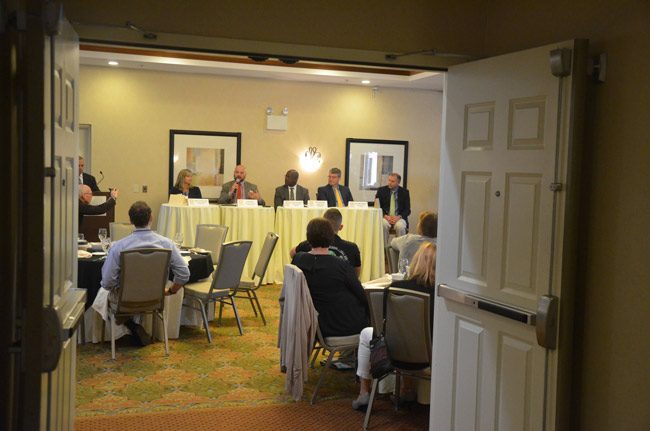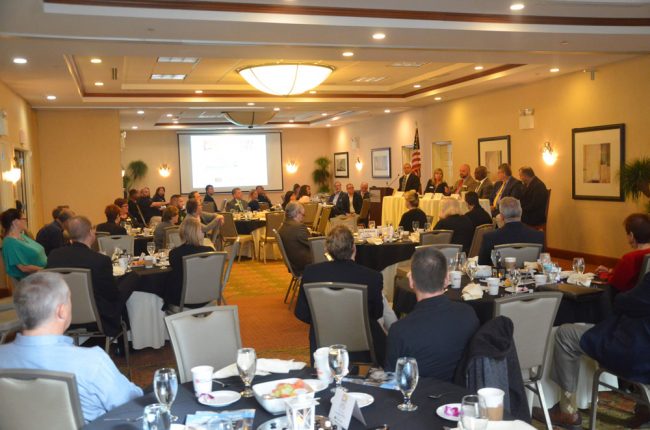
(© FlaglerLive)
The word “alignment” was spoken again and again this morning during a forum on education in Flagler, a word an audience stocked with business leaders liked to hear: alignment between traditional education and the job sector. Alignment between mentoring and internship programs and particular companies. Alignment between new trends in employment and new degree programs being developed at a local college and a university.
And alignment between the community and its education foundation, whose job it is in large part to ensure that such alignments thrive.
“Our role here is to really be that connector. We’ve got to build these kids’ networks,” Flagler Education Foundation Executive Director Joe Rizzo told the gathering of 60-some people. “So when we’re sitting down and we’re all talking, we’re all having the same conversations. It is absolutely, positively the most important thing that we give these kids–the network that they need to grow.”
Rizzo was speaking in particular of a new career coaching program intended to “make sure that every one of our kids gets partnered with a community member so when it is time to graduate from high school there is no doubt on what path this kid’s going to go. There is no doubt who they need to talk to about getting this job or developing this career or getting into this school. So I just ask everybody here today to please get involved in raising these kids because it does take a village.”
The Education Foundation is the non-profit arm of the school district, bridging district programs with residents and businesses, whether it’s through school tours or aggressive fundraising that helps pay for numerous college scholarships for underprivileged children or basic necessities to ensure that poorer students attend school on an equal footing with others.
An emphasis on increasingly direct ties between classrooms and the workplace.
The Flagler school district is the largest employer in the district by far, employing 2,484 people in 22 job classifications. But education in Flagler is a much more varied ecosystem, with technical education, Daytona State College, Embry Riddle Aeronautical University and other private entities playing considerable roles that aren’t always obvious.
Rizzo appeared alongside Earl Johnson, executive director of leadership and operations for Flagler schools and Superintendent Jim Tager’s right hand, Renee Stauffacher, director of the Flagler Technical Institute–the district’s vocational and adult education school–Tom LoBasso, president of Daytona State College and Lon Moeller, senior vice president for academic affairs and provost at Embry-Riddle Aeronautical University.
The Flagler Chamber of Commerce roughly once a year devotes one of its Common Ground breakfasts to spotlight local education’s major players, as it did this morning at Palm Coast’s Hilton Garden Inn.
Rizzo and Johnson spoke at length of what has become its own showcase in Flagler schools: the district’s 21 “flagship” programs spread between the district’s 10 schools, each with a program that familiarizes students with skills or a vocation closely tied to the local job market. Flagships include health care, aviation, firefighting, law and law enforcement, agriculture, and so on. Some 2,300 students are enrolled in what amounts to 52 career technical classes. Many of them will graduate ready to work without further training. The firefighting flagship at Flagler Palm Coast High School, which has 200 students, will graduate 11 students who can sit for an exam and go straight to work. “They are far more prepared than anyone who would just sign up to go to a fire school,” Rizzo said.
The classroom-to-career program begins in elementary school with exploratory paths. “We’re not trying to get those students to determine what paths they’re going to take when they go to college or when they go into a career,” Johnson said. “We’re just giving them an opportunity to explore different pathways. Then once they get into the middle schools they’re able to grow into that pathway or move into a different pathway. As they get into high school, that’s when they receive the acceleration points or a certification that they can go straight into the job force.”

The speakers naturally used the occasion to play up a few institutional highlights–the school district’s vastly improved graduation rate, now at 88 percent, including a 14-point jump in the graduation rate of black students, the Flagler Technical Institute’s 100 percent job placement of graduates of its commercial vehicle driving program and its development–with Palm Coast officials–of a water treatment plant operation training program; at Embry-Riddle, the similar, 97 percent success rate for students either finding jobs in their fields of study or continuing on to post-graduate education; the doubling of fund-raising hauls since Rizzo took over the Education Foundation; Daytona State’s guaranteed pipeline into state universities, once a student has a two-year degree (“kind of like having a Fast Pass at Disney,” the often witty LoBasso said), the 2,051 students enrolled at DSC’s Palm Coast campus, 188 of whom graduated with college peers one week then graduated from high school the next–fruit of the district’s popular dual enrollment programs–and the development of new degree programs at both Embry Riddle and DSC, such as data analysis at both (a new hot field to help companies make sense of avalanches of data).
LoBasso noted the opening of the new L. Gale Lemerand student center at DSC’s Daytona campus, an 84,000 square foot facility that includes the library and writing center, a study commons, classrooms, conference rooms, an events center and Career Services, a one-stop resource center for career planning and job placement.
And this t=reaction by a DSC student, as LoBasso relayed it this morning: “‘Oh my God there’s a Starbucks, I’m going to go so broke.’ And I’m joining her as well,” the DSC president continued, “most mornings you’ll find me in the cafe.”
Toward the end of the forum, in response to a question about how the education organizations are positioning students to navigate major issues from climate change to societal challenges, Embry-Riddle’s Moeller said: “I’ve been really impressed by this generation of students. Their connection with social responsibility, the fact that they want to make a difference as opposed to making a paycheck when they graduate.”





























Tim Hale says
We have many talented students in our community. It is great to get them connected with career paths & career opportunities in the region. Our local educators are doing a good job trying to make that happen. it’s wonderful to see.
snapperhead says
Where’s the flagship programs for auto technician, plumber, electrician,HVAC, carpenter, welder, machine shop etc.. All courses offered in my High School 30 years ago. all decent well paying careers…I know quite a few who went on to open their own business. Blue collar workers are still needed in this country. Not every kid is cut out to be a scientist, engineer, tech guru etc. and even fewer will find those opportunities here. Where’s that alignment?
Steve Robinson says
Was talking a few weeks ago with a custom home builder, who has been building homes on the west coast of Florida for 30 years. He said he used to have four or five plumbers working, and about the same number of framers and electricians. Now he has one of each. Said that at a recent convention of the National Home Builders Association, most of the talk was about who they are going to get to build houses 10 years from now, as kids are not going into the building trades. They talked about paid internships, etc., but if these big, national developers want to stay in business they should ante up for some of these programs in the high schools.
William Moya says
Sad, wrong, and wicked. Utilitarianism is alive and well in Flagler county, which seems to be a hub of government and business to turn everyone of our students spokes in a well oiled machine. Apparently we have learn nothing for the impact the original developers, i.e. builders whose sole purpose was profits.
Education in the early years levels 1-10 should be about introducing students to the world they are living in and all its possibilities. showing student all the possibilities and the wonders of life. This we will allow them to make their choices and not those of what others may deem to be good for them.
Life and nature are chaotic, many of the problems in our society, political and social, stem from the idea that you choose a path go to church and everything will be honky dory, most of us know that you plan for a, b, and c; and life will then show you d, e, and f. Apparently the policies discussed in this panel were intended to serve our Capitalistic society.
Nick says
@ Steve—
Bigger issue here is that the homebuilders want to sub everything out dirt cheap… GCs making big money, owner of the electrical/HVAC/plumbing company making a little money and the guy turning screws getting $12-$14 and yelled at.. ‘you might get a $1 raise next year’ …..the kids who can pull it off would rather just move up north or out west and the ones who stay home mostly flounder. Hard to start from scratch in these parts… The builders enable it b/c for the most part they don’t give a f* about ‘craftsmanship’ they just want it to pass inspection so they can slam the next one together…
It’s not that today’s kids are lazy, it’s that they don’t see the point in putting in max effort for minimum results.. Boomer builders want their big diesels and offshore boats and that means little Johnny doesn’t get benefits.